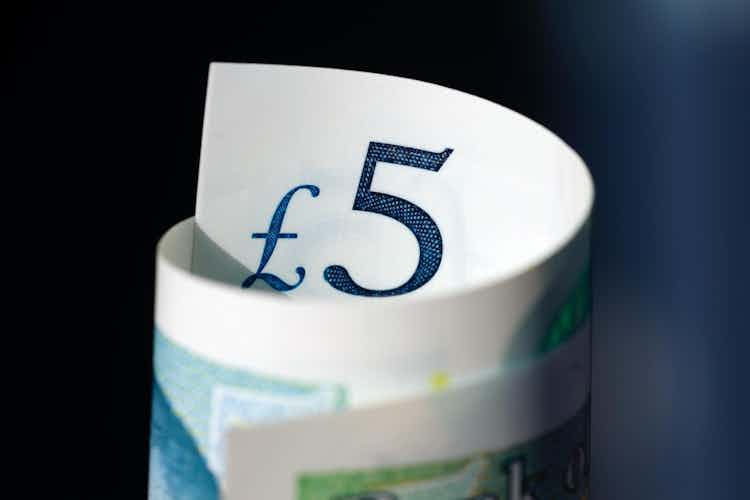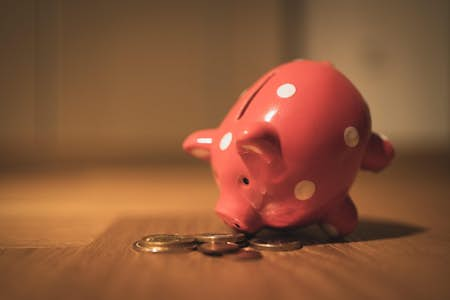Saving money when you're older might be a bit of a bore, especially after a long hard-working career, but it's often essential. This is particularly the case when the cost of living rises and eats into your spare cash. Those increased costs reduce your ability to spend on the finer things in life.
Despite increases in the cost of day to day essentials, it's still possible to put a little aside every month into an emergency fund or to help save up for that holiday of a lifetime. You know, the one that you dreamt you'd have when you retired. By saving up slowly but surely, you'll also ensure that you do not have to buy your holiday - or any other luxury - using a credit card.
Let’s explore how you can save and look at some key ways to make your money work harder, leaving you with the ability to live a far more carefree retirement.
Discover stocks and shares ISAs from the UKs leading providers. Click on your chosen provider to get started!
Money saving tips for when you’re older
The following tips can help you save money, particularly if you're about to retire or are already drawing a pension. Using just one or two will make a difference to how much available cash you have at the end of each month. That said, using them all at once will help you achieve your financial goals far sooner.
Look at your current spending habits
If you're approaching retirement or already living on your pension, one vital thing to do is appraise your current spending habits. Look at how much your regular expenditures are like energy bills, broadband, car insurance, and childcare. When you do, you give yourself a far better idea of where the majority of your cash is going each month.
In doing so, you'll identify where you may be able to make some savings. We would all like our energy bills and weekly shopping to be cheaper. But you also see the areas where you need to cut back by evaluating your current spending habits. When it's all in front of you, you see how much you're spending on nonessential items.
When looking at your bank account and statements, be brutally honest about where your spending money is going. Budgeting apps are an excellent way to support your spending analysis. Some automatically tot up your spending into 'genres' or 'sectors'. As such, they can show you how much of your monthly income you are spending down the pub, on clothes, or food shopping, for example, which can be helpful when trying to control your spending. They also may be beneficial in identifying which retailer you spend the most with, which may be a place you can make savings too.
Use comparison websites
Once you have carried out a robust audit of your spending, you can then start to address where you can make the best savings. So often, our household bills creep up without us realising. Reducing your bills will help you save money, but doing so can be onerous. Price comparison websites can be a vital tool in driving down your bills, and savings can quickly add up to a substantial amount.
Plus, comparison websites can be a good idea to turn to whenever you make a big purchase. Holidays abroad, for example, can be an area where overspending can easily occur. So allowing a price comparison site to round up your options can mean you get the best value for money and save yourself some cash.
Double-check your direct debits
Like our household bills, direct debits sometimes leave our accounts without us realising. If you have a direct debit or standing order with a company, perhaps paying for subscriptions through online banking, you may have forgotten that you had it in the first place. Or you may be guilty of seeing the amount leave your account, vowing to cancel it, and then forgetting as soon as another distraction comes along.
Yet, if you're trying to save money, finally getting round to cancelling all those old direct debits could add up. So remember to review your standing orders and direct debits to prevent unnecessary spending.
Clear credit card debt
Credit cards are an easy way of getting into bad spending habits before payday. That can be particularly the case if your pension is lower than your previous salary. Adjusting to the change can be a shock, and you may find that if you've maxed out your overdraft, spending on a credit card is the next option.
Yet, it's such an expensive way to be spending your hard-earned cash. Credit cards often come hand in hand with sky-high interest rates, so if you don't pay off your credit card in full each month, you will spend more than necessary simply servicing your debt. Instead, that money could be squirrelled away into a savings account for a rainy day.
In short, one of the best ways to help become one of the best savers around is to pay off your credit card debt as soon as feasibly possible. You could also benefit from looking into a balance transfer to a 0% interest card that can help you clear the debt quicker. Do be sure, though, not to get caught out on any technicalities that leave you in a worse position than you started.
Set up a regular savings account
Once you've got a handle on where your money is going and where you can make those savings, it's an excellent time to set up a regular savings account. Doing so should be part of any savings plan.
By consistently paying into a regular savings account, you'll find that you put some money away. That does not mean you need to put money aside into a savings account specifically called a regular savings account. It means that you place a set amount aside each month into an interest-bearing account - perhaps a cash ISA, an investment fund or any other suitable financial product that suits your risk profile.
Doing it regularly, the day after payday, is one of the best things you can do to improve your financial situation. So many people struggle to save money when they intend to put away the money they have left over before the end of the month. However, that’s more difficult to do on a pension which is often smaller than a salary.
Plus, it takes a great deal of willpower not to spend money when it's in your account. Take, for example, when you get home on a Friday night. It's tempting to 'just' purchase a takeaway after a busy week instead of saving that money if you see it in your account. Yet, if you had put money aside at the beginning of the month, you'd probably be more inclined to get a "fakeaway" from the supermarket. If you had already seen that your funds were running low, you might not have ever entertained the idea of an expensive takeaway in the first place.
Make sure you're tax-efficient
In the run-up to retirement, it's crucial to make your money work as hard for you as possible. While that can mean making well-timed and placed investments, it also means ensuring you're tax efficient.
Being tax efficient does not mean dodging tax, far from it. It means ensuring you're not spending any more on tax than necessary. Ensure that you're claiming tax relief where you're entitled to it and are making the most of your allowances.
For example, cash ISAs and stocks and shares ISAs are savings products that do not attract tax. However, be sure that you're also making the most of any savings you could make from tax relief on pension savings. Additionally, when it comes to taking money from your pension pot, ensure you minimise the tax you pay by taking money out in a tax-efficient manner. I.e. take the tax-free allowance amount when most appropriate. Or, if you're still paying into your pension, be sure you're doing so in a way that you're not attracting more income tax than necessary.
Hold off making that purchase
Modern, personalised marketing can make it tempting to buy every item that piques your interest. However, doing so can mean spending so much money on things you do not need.
For that reason, it can be a good idea to hold off buying a nonessential item for as long as possible. Then, if, after four weeks or more, you're still thinking of that item and lusting after it, make the purchase. However, if after your cool-off period, your feelings have waned somewhat, you'll have saved yourself the cost of the item that you never really needed in the first place.
Vicky Smith, editor at making and saving money ideas website More Than A Mummy (www.morethanamummy.com), agreed with these tips. She told Pension Times: “The best place to start when it comes to saving money is to understand your current spending habits. You may think you have a handle on it but writing down absolutely all of your financial commitments and extra spending, such as takeout coffees, meals out and extras like haircuts, may surprise you.
"This then gives you a chance to evaluate where you can make savings right now, for example, subscriptions that you rarely use. Then you can consider whether you would like to be saving a little more each month and where you can claw that money back from your current outgoings. For some people creating a monthly 'treats' budget is helpful, as it helps motivate you to stick to your savings plan while also giving you something to enjoy.
"You may also find you can cut costs on your weekly supermarket shop by meal planning and/or switching supermarkets to one of the cheaper brands. Keeping a regular track of your savings progress can also be hugely beneficial, as it can show you how far you can come in a relatively short space of time and keep you going.”
Ola Majekodunmi from All Things Money added: "If you are someone that struggles to clear your credit card debt, then you can also reach out to organisations such as StepChange and Christians against Poverty who are able to offer free debt advice.
"An extra tip I would add is to consider using Cashback websites. Cashback websites reward shoppers with a certain amount of cashback when they shop through cashback websites such as TopCashback and Quidco which can be a great way to save some extra cash when shopping as usual!"
How to find a good savings account
Regularly syphoning off money from your monthly income (whether your salary or pension) is undoubtedly one of the best habits you can get into. Your financial situation will improve no end if you have an emergency fund that you bolster every month. By doing it after payday, you'll soon adjust to what money you have spare to spend each month and budget accordingly.
However, you mustn't just leave that money languishing in a current account. While current accounts are great for instant, penalty-free access, they rarely pay interest. It means that by leaving your money in the account without spending it, you're losing the value of your cash due to inflation. So when inflation skyrockets, you lose your purchasing power.
As a result, paying money into an appropriate savings account for your circumstances is vital. Bearing that in mind, remember to think about the following when looking into the best places to keep your money:
1. Time frame
As you near or enter retirement, your time frame for when you need your saved cash can differ from someone younger. Therefore, it's likely that locking your money away into a long-dated financial product that penalises you for withdrawals before maturity is not suitable.
2. Interest rates
The idea of identifying a great savings product for you is to find a product with the highest interest rate possible. The higher the interest rate, the more money your cash will earn. However, financial products are all structured so differently that it's a balancing act trying to get the highest interest rate versus:
- How long you have to lock your money away
- How much money you need to pay in
- Any other criteria that a provider allocates a product
While trying to get the highest rate you can is crucial, it's sometimes better to go for a lower rate on a product with other criteria that suit you better.
3. Risk tolerance
You need to consider the above two factors alongside your overall risk tolerance. Risk tolerance is how well you can absorb losing value in your savings accounts and how happy you are to take on risk. For example, your risk tolerance is considered high if you have many other assets, particularly liquid assets, and are also happy to invest in potentially riskier financial products like cryptocurrency. On the other hand, your risk tolerance is low if you have very low cash balance accounts and few assets and only want to invest your money in safe-haven assets.
Saving money when you’re older
Saving money when you're older can be more difficult due to a lower monthly income from a pension pot, but it's also crucial. As you have a lower income, you're more susceptible to feeling the effects of significant outgoings.
Consider, for example, having to install a new boiler in your retirement. That's an expensive thing to pay for out of the average pension and can also be a significant hit to your pension pot. You're not topping up that pension pot from your salary any longer, so by putting some money aside for an emergency fund, you're protecting yourself against financial shocks.
Taking heed of the above money-saving tips and using them in conjunction with one another can be an extremely effective way to keep your finances looking healthy throughout retirement.







